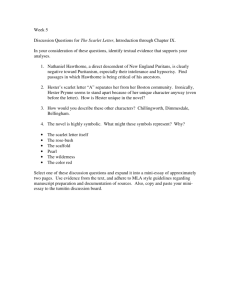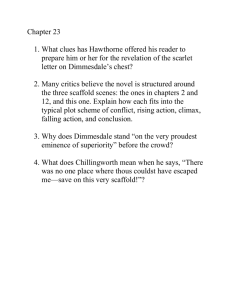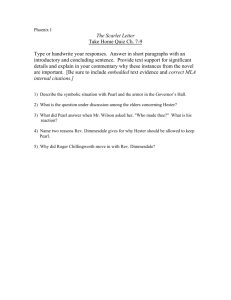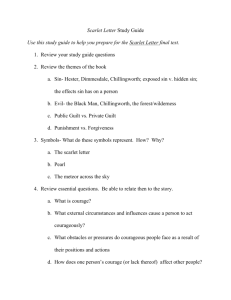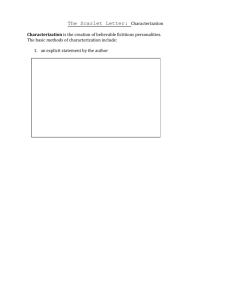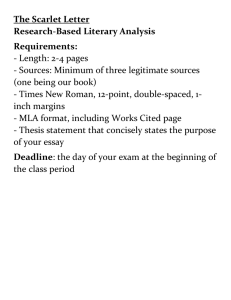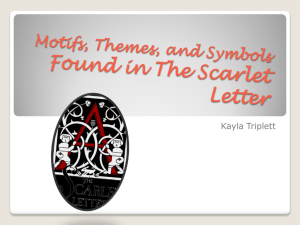The Scarlet Letter PowerPoint Overview
advertisement
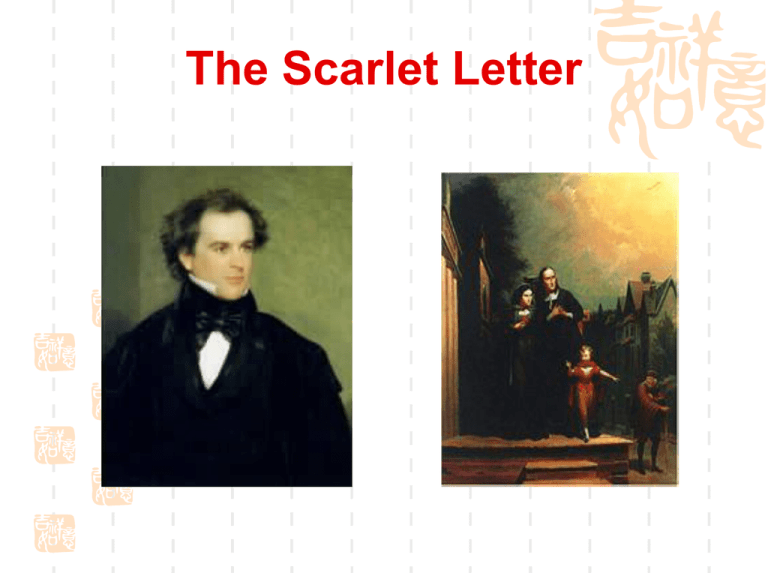
The Scarlet Letter Analysis of characters Hester Prynne the main characters Arthur Dimmesdale Roger Chillingworth Major characters in The Scarlet Letter Roger Chillingworth Arthur Dimmesdale Hester Prynne daughter Pearl Major characters in The Scarlet Letter attractive, appealing, intelligent, capable Passionate — has a love affair with Dimmesdale strong and stoic —she endures years of shame and scorn Hester contemplative— speculates on human nature, social organization, and larger moral questions. maternal—moderates her tendency to be rash; cares for the poor and brings them food and clothing a protofeminist mother figure to the women of the community Why does she repeatedly refuse to stop wearing the letter? A--“her passport into regions where other women dared not tread” her behavior She desires to she is determined She is determine her to transform its unwilling to own identity meaning through erase her past rather than to her actions and deed and her allow others to her own selfpast decisions determine it for perception her She is not the example of sin that she was once intended to be. Rather, she is an example of redemption and self-empowerment. What makes Dimmesdale’s mental anguish? 1.Hester takes all of the blame for their shared sin, leading to his guilty conscience and resultant mental anguish. 2.The townspeople do not believe Dimmesdale’s protestations of sinfulness. This drives Dimmesdale to further internalize his guilt and selfpunishment and leads to still more deterioration in his physical and spiritual condition. true evil Chillingworth his name --- a man deficient in human warmth His appearance--- twisted, stooped, deformed shoulders--- his distorted soul His identity of a “leech”---he feeds on the vitality of others as a way of energizing his own projects. He is obsessed with revenge---after Dimmesdale dies, Chillingworth no longer has a victim. Having lost the objects of his revenge, the leech has no choice but to die. Themes of The Scarlet Letter Doesn’t intend to tell a love story or a story of sin Hawthorne-- assumes the universality of guilt explores the complexities and ambiguities of man’s choices focuses his attention on the moral, emotional, and psychological effects of the sin on the people Hawthorne Everybody is potentially a sinner, and great moral courage is indispensable for the improvement of human nature. The book is an examination of the forces that shape Hester and the transformations those forces effect, a hymn on the moral growth of the woman who is sinned against. sinners Hester confesses her guilt, faces the future optimistically, helps others is able to construct her life, wins a moral success Dimmesdale Chillingworth hides his guilt first undergoes the physical and spiritual torments morally degrades by his pursuit of revenge die moral growth angel Writing Characteristics 1) It is a cultural allegory and structurally compact. twenty-four chapters are knitted together by scaffold scenes. In the beginning, the middle, and the end, all the four major characters are at the scene. Writing Characteristics 2) Hawthorne's ambiguity People offer different views concerning the sign of the letter A on the dead minister's chest. The author doesn't give his views. So, people come up with different interpretations. Writing Characteristics 3) It is a kind of romance. Two lovers come together, and will be finally united in death. 4) Hawthorne uses the supernatural. The appearance of the symbol A in the sky is in twilight atmosphere. All things, natural or otherwise, may become probable. Writing Characteristics 5) His use of symbols the central symbol the scarlet letter “A” Adultery a token of shame Able Angel “A” appears in the sky What does “A” mean to the chief characters respectively? For Puritan society, it just means punishment. For Hester, it means unjust humiliation. For Dimmesdale, it’s a reminder of his own sin. For Chillingworth, it’s a request for revenge. For Pearl, it’s nothing but a beautiful cloth. It is a guide for Hester to go to heaven, and Dimmesdale to hell.
